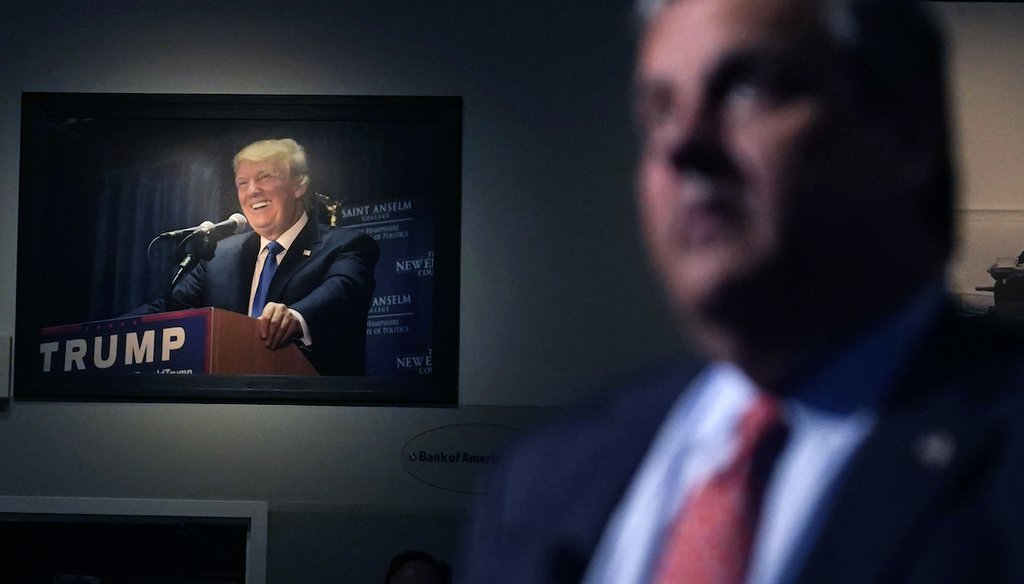Get PolitiFact in your inbox.

A photograph of former President Donald Trump hangs on the wall as Republican presidential candidate, former New Jersey Gov. Chris Christie listens to a question during a gathering, Tuesday, June 6, 2023, in Manchester, N.H. (AP)
Trump did not sign any major immigration laws, but he did issue orders that changed policy
If Your Time is short
- It has been decades since Congress enacted major immigration legislation, and that includes Trump’s presidency.
-
Trump’s time in office saw 472 measures on immigration that had drastic implications, according to one think tank’s estimate. His executive actions included efforts to restrict access at the southern border.
Chris Christie has offered many reasons why he is running against his former ally Donald Trump in the Republican presidential primary. Since announcing his candidacy, Christie, a former New Jersey governor, has blamed Trump for the chaos at the U.S. Capitol on Jan. 6, 2021, for the ballooning national debt and for illegal immigrants "pouring over our southern border."
"It is his fault because he never changed one immigration law in the two years that he had Republican control of Congress," said Christie during his June 6 announcement in New Hampshire. "Not one immigration law did he change. He didn’t build the wall, and Mexico is laughing at the idea that they were going to pay for a wall on their border."
Trump’s immigration policies made a lot of news while he was in office, but Christie is largely correct that Trump did not sign any major immigration law during his presidency. What Christie’s statement dismisses, however, is the impact of Trump’s executive orders and Congress did approve money for a border structure.
Changes during Trump’s tenure increased enforcement and restricted legal immigration, according to the Migration Policy Institute, a nonpartisan policy group.
And Trump’s administration "set an unprecedented pace" for executive actions, notching 472 changes, the institute found in a 2022 report.
"The Trump administration was arguably the first to take full advantage of the executive branch’s vast authority on immigration," the report states.
But a comprehensive change to actual immigration law hasn’t happened in decades — under either Democratic or Republican administrations, even when the White House and Congress were controlled by the same party.
David Bier, associate director of immigration studies at the libertarian Cato Institute, said "the executive actions are hugely important, but not as important as laws. Laws are more important because they last for much longer and can’t be reversed by a president."
The last major legalization effort was the 1986 law signed by President Ronald Reagan. Congress passed some other notable immigration laws in the 1990s and 2000s, most recently the 2006 Secure Fence Act, passed after the Senate failed to enact immigration reform. The 2006 bill mandated the construction of 700 miles of a fence on the southern border.
Trump entered the White House promising a southern border wall to stop illegal crossings and saying he’d work with Congress to pass laws to crack down on illegal immigration. Trump failed to complete a border wall, though he did achieve funding for some of it. And Congress failed to pass any immigration bills even when Republicans controlled both chambers.
Rick Su, an immigration law professor at the University of North Carolina, said executive orders can change policies in major ways.
"For example, that is one of the arguments against (Deferred Action for Childhood Arrivals); that Obama essentially rewrote the law and set up a legal system that was not approved by Congress," Su said. The program deferred deportation for certain people who are in the U.S. illegally but arrived in the U.S. as children and met strict criteria.
Trump viewed executive actions as his best chance to get what he wanted without having to negotiate with Congress or share the credit, Theresa Cardinal Brown, director of immigration and cross-border policy at the Bipartisan Policy Center, previously told PolitiFact.
We emailed a contact for Christie’s campaign and received no response.
What Trump achieved through executive action
Working through executive actions, Trump advanced several of his immigration promises, but other attempts were slapped back by courts or rejected by Congress.
In January 2017, Trump signed the first version of what he called a "travel ban." The Supreme Court in 2018 upheld the third iteration of the ban. The bans prevented nationals from multiple Muslim-majority nations in the Middle East and Africa to varying degrees. Biden reversed the policy in 2021.
The Trump administration created the Migrant Protection Protocols, or "Remain in Mexico" program, in January 2019 via a Department of Homeland Security memo. The program sent tens of thousands of migrants seeking asylum back to Mexico to await their immigration court proceedings.
The Biden administration tried to end "Remain in Mexico" in 2021 but was challenged in court. The U.S. Supreme Court in 2022 ruled 5-4 that the Biden administration could end Remain in Mexico. The policy is still being litigated.
The COVID-19 pandemic gave Trump another route to restrict immigration. In March 2020, the Centers for Disease Control and Prevention issued an order using Title 42, a public health policy, to quickly expel people arriving at the southern border. The COVID-19 public health emergency lifted May 11, and so did the policy.
Some actions by the Trump administration were through policy rather than formal orders. Amid an increase in southwest border apprehensions in 2018, the Trump administration had a "zero-tolerance" policy to deter illegal immigration, which led to the separation of thousands of children from their parents. More than 650 children were separated from their parents during a two-week period in May as a result of the new approach being implemented. After public backlash, Trump signed an executive order to instead detain families together.
On the whole, Trump-era policies blocked asylum access for most seekers and contributed to a decrease in people coming to the border, the Migration Policy Institute found.
Congress blessed some money for Trump priorities
Technically speaking, Trump did earn some immigration-related legislation through congressional appropriations bills, said Kathleen Bush-Joseph, a policy analyst at the Migration Policy Institute. He also diverted money from the Defense Department for the border wall.
What this shows is how much discretion and authority Congress has given the president through enacted laws.
"That is why executive orders can change practices and policies so radically," Su said. "Even if they are not laws, they feel like it, because they are within the broad authority that Congress has given the executive branch over the years with respect to immigration."
Our ruling
Christie said Trump "never changed one immigration law."
No major bill passed during Trump’s presidency to change immigration law.
But it’s worth clarifying that the Trump administration enacted hundreds of changes in immigration policy through executive action and earned funding for some of his priorities, including border wall projects. Executive actions can be powerful, but they can be easily undone by new administrations.
The statement is accurate but needs clarification or additional information. That’s our definition of Mostly True.
RELATED: Ron DeSantis' claim that Trump wanted to grant ‘amnesty’ to 2 million people needs context
RELATED: Donald Trump’s immigration promises: failures and achievements
Our Sources
C-SPAN, Chris Christie Announces Presidential Campaign at New Hampshire Town Hall, June 6, 2023
Migration Policy Institute, Four Years of Profound Change: Immigration Policy during the Trump Presidency, February 2022
Migration Policy Institute, Major U.S. immigration laws 1790-March 2013
Congress.gov, Emergency Supplemental Appropriations for Humanitarian Assistance and Security at the Southern Border Act, July 1, 2019
White House, Proclamation on Ending Discriminatory Bans on Entry to The United States, Jan. 20, 2021
NPR, Biden Has Overturned Trump's 'Muslim Travel Ban.' Activists Say That's Not Enough, March 6, 2021
U.S. Supreme Court, Biden v Texas, 2022
Justice Action Center, Texas v. Biden (TX RMX) - District Court, May 2023
PolitiFact, What you need to know about the Trump administration’s zero-tolerance immigration policy, June 6, 2018
Factcheck.org, FactChecking Chris Christie’s Presidential Announcement, June 7, 2023
Email interview, Kathleen Bush-Joseph, associate policy analyst, US Immigration Policy Program, Migration Policy Institute, June 8, 2023
Email interview, David J. Bier, associate director of immigration studies at the Cato Institute, June 8, 2023
Email interview, Rick Su, an immigration law professor at University of North Carolina, June 8, 2023
Browse the Truth-O-Meter
More by Amy Sherman
Trump did not sign any major immigration laws, but he did issue orders that changed policy
Support independent fact-checking.
Become a member!
In a world of wild talk and fake news, help us stand up for the facts.
















































